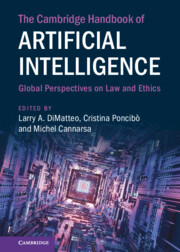Book contents
- The Cambridge Handbook of Artificial Intelligence
- The Cambridge Handbook of Artificial Intelligence
- Copyright page
- Contents
- Figures
- Contributors
- Foreword
- Preface
- Part I AI: Development and Trends
- Part II AI: Contracting and Corporate Law
- Part III AI and Liability
- Part IV AI and Physical Manifestations
- Part V AI and Intellectual Property Law
- Part VI Ethical Framework for AI
- Part VII Future of AI
- 23 AI Judges
- 24 Combating Bias in AI and Machine Learning in Consumer-Facing Services
- 25 Keeping AI Legal
- 26 Colluding through Smart Technologies
- 27 The Folly of Regulating against AI’s Existential Threat
- 28 AI and the Law
23 - AI Judges
from Part VII - Future of AI
Published online by Cambridge University Press: 28 July 2022
- The Cambridge Handbook of Artificial Intelligence
- The Cambridge Handbook of Artificial Intelligence
- Copyright page
- Contents
- Figures
- Contributors
- Foreword
- Preface
- Part I AI: Development and Trends
- Part II AI: Contracting and Corporate Law
- Part III AI and Liability
- Part IV AI and Physical Manifestations
- Part V AI and Intellectual Property Law
- Part VI Ethical Framework for AI
- Part VII Future of AI
- 23 AI Judges
- 24 Combating Bias in AI and Machine Learning in Consumer-Facing Services
- 25 Keeping AI Legal
- 26 Colluding through Smart Technologies
- 27 The Folly of Regulating against AI’s Existential Threat
- 28 AI and the Law
Summary
Technological tools currently being developed are capable of substantially assisting judges in their daily work. In particular, data analysis of widely available court decisions will evaluate, in an unprecedented way, the activity of the courts and the quality of justice. In doing so, it will allow for more efficient and faster dispute resolution, as well as cost reductions for litigants and society. Technological evolution will probably not cause the disappearance of humans from judicial adjudication but a new, progressive and subtle redistribution of tasks between men and machines.
Keywords
- Type
- Chapter
- Information
- The Cambridge Handbook of Artificial IntelligenceGlobal Perspectives on Law and Ethics, pp. 347 - 363Publisher: Cambridge University PressPrint publication year: 2022
- 1
- Cited by

